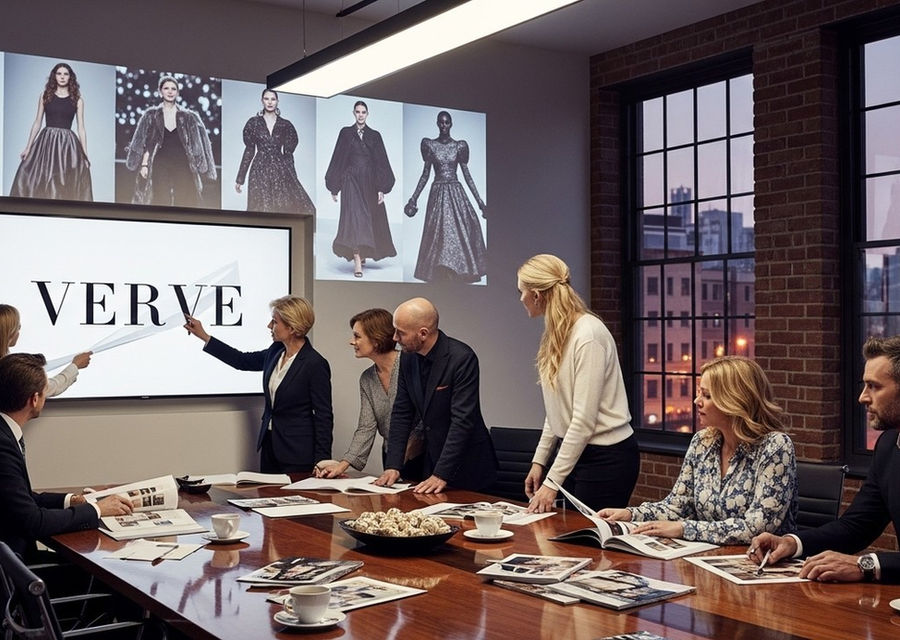Vogue editor Chloe Malle Takes the Reins: A New Chapter in Fashion Journalism
- THE MAG POST

- Sep 10, 2025
- 5 min read

Vogue editor Chloe Malle signals a new phase for a global fashion institution, steering a storied masthead toward contemporary currents while preserving its legacy. The appointment is a bellwether moment for editorial culture, talent development, and the magazine's delicate balance of prestige and digital reach.
Beyond headlines, observers weigh the cultural implications of a high-profile legacy passing to a younger generation and a figure who publicly described herself as a nepo baby in an interview. Critics argue for accountability and merit, while supporters highlight a curated blend of industry networks, mentorship, and renewed international ambitions.
Vogue’s Leadership Transition: A Fresh Lens on a Fashion Institution
A bold change at the helm reshapes how luxury storytelling intersects with mass appeal.
This transition reframes editorial culture, talent development, and audience expectations as Vogue navigates digital disruption and a changing luxury landscape.
Who is Chloe Malle?
Chloe Malle's upbringing blends fashion sensitivity with media instincts; she has worked across editorial desks and fashion weeks, shaping a voice that resonates with younger readers while staying true to Vogue's prestige.
Her early career path blends magazine culture, event production, and digital partnerships, suggesting a hands on approach to shaping cover stories and platform experiments. The appointment raises questions about merit, mentorship, and how editorial craft translates into branding.
Why now, and what changes might follow?
The timing aligns with a rapidly shifting media landscape, where readers expect speed, depth, and cross platform storytelling from a single fashion authority. Vogue faces competitive pressure from digital-native outlets while maintaining its luxury aura and editorial rigor.
Anticipated changes may include more global editions, faster online storytelling, and renewed emphasis on inclusivity, sustainability, and creator collaborations. If executed well, the transition could expand Vogue's cultural influence while preserving the magazine's editorial standards and distinctive voice.
Wintour’s Legacy and the Timing of Succession
Anna Wintour's four-decade tenure left a lasting imprint on fashion media, shaping cover aesthetics, talent pipelines, and the magazine's global reach.
The public succession signals a controlled, strategic handover rather than a sudden departure, reflecting a governance language familiar to major brands navigating succession with care and clarity.
A forty-year throne and its imprint
Wintour built a durable aesthetic and a newsroom culture centered on gravity, relevance, and high-profile collaborations. Her imprint extended beyond fashion pages into cultural conversations and strategic partnerships that anchored Vogue as a global authority.
Long tenure fostered institutional memory, a robust talent ladder, and a networked ecosystem of industry insiders. The challenge now is sustaining that legacy while inviting fresh viewpoints that keep Vogue current in a fast-moving media environment.
LinkedIn recruitment and corporate signaling
The public search for a successor through a professional network underscores a modern, transparent leadership approach and a willingness to invite broad visibility into the process.
Such signaling can reassure advertisers and partners about governance while inviting scrutiny of editorial stewardship, newsroom culture, and the balance between heritage and innovation during the transition period.
Industry Reactions: Nepotism, Merit, and Momentum
Industry chatter frames the transition as a test of merit versus pedigree, illuminating how traditional gatekeepers adapt to evolving expectations and new leadership models.
The discourse also probes the role of networks, mentorship, and editorial independence in sustaining an iconic fashion title under contemporary pressures.
The nepotism conversation in fashion media
Some commentators view a well-connected background as a potential accelerant for influence and access, arguing that networks matter in shaping editorial opportunities and collaboration prospects.
Others push back, insisting that rigorous editorial discipline, transparency, and demonstrable craft are the true determinants of credibility and long-term reader trust in a high-profile publication.
Editorial strategy under new leadership
Legacy brands must balance reverence for tradition with the imperative to experiment, ensuring coverage remains compelling for diverse audiences while preserving core values and journalistic standards.
If Chloe Malle anchors a clearly articulated strategy, Vogue could blend flagship storytelling with platform-driven experimentation, expanding reach without diluting the magazine’s prestige or reader loyalty.
Editorial Direction in the Digital Era
Digital disruption demands speed, versatility, and a global lens, challenging fashion journalism to move beyond print rhythm into real-time cultural conversations.
The next phase will be measured by how editorial voice translates couture prestige into shareable, responsible storytelling that resonates across platforms and cultures.
Digital storytelling and global audiences
Expect shorter formats, immersive visuals, and collaborative projects that invite creators and communities into Vogue’s narrative universe, while preserving the editorial backbone that has defined the brand for decades.
Regional editions and localized curation may become more prominent, ensuring Vogue speaks to diverse fashion ecosystems without fragmenting the brand’s overarching voice.
Brand partnerships and audience trust
Maintaining editorial integrity while pursuing partnerships requires clear boundaries and transparent disclosure, ensuring readers perceive content as credible and not merely commercial messaging.
A disciplined approach to sponsorships and exclusive collaborations will help Vogue sustain trust as luxury brands increasingly seek integration across media ecosystems.
Governance, Mentorship, and Measuring Success
Resilient governance blends legacy practices with adaptive leadership, creating spaces for mentorship and disciplined succession planning that safeguard quality during transitions.
Clear accountability, performance benchmarks, and cross-functional oversight help align newsroom ambitions with strategic objectives in a changing media marketplace.
Governance structures for legacy brands
Effective governance combines editorial guardrails with agile decision-making, ensuring that long-term vision remains clear even as leadership evolves and external pressures mount.
Structured mentorship programs and rotating advisory panels can cultivate new voices while preserving editorial standards and institutional memory.
KPIs and short- versus long-term impact
Early indicators include audience growth, engagement depth, and quality of partnerships, alongside editorial diversity and inclusion metrics.
Longer-term success should reflect brand equity, cultural relevance, and the magazine's ability to shape conversations that outlast quarterly cycles and market fluctuations.
Key Takeaways
A high-profile transition at Vogue reframes risk, opportunity, and the craft of fashion journalism. It invites scrutiny of merit, governance, and how heritage platforms adapt to a digital-first world.
Future success will hinge on editorial merit, disciplined governance, and the capacity to fuse a storied legacy with fresh momentum across global audiences.
What readers should expect from this transition
Readers should anticipate a sharper blend of classic Vogue sensibility with modern storytelling that travels across platforms and formats, maintaining depth while expanding reach.
The newsroom will likely emphasize inclusivity, cross-cultural perspectives, and authentic brand partnerships that reflect evolving consumer values and a changing luxury landscape.
Best practices for leadership transitions in media
Transparent succession planning, transparent criteria for appointments, and proactive mentorship can sustain quality and continuity while inviting new voices and ideas.
A deliberate, well-communicated transition framework serves as a model for other legacy outlets facing disruption in a digital era.
Aspect | Summary |
New Editor | Chloe Malle takes Vogue helm, succeeding long-time editor Anna Wintour in a controlled transition. |
Context | Transition follows Wintour's 40+ year tenure; LinkedIn advert signaled search; Malle's well-connected background. |
Editorial Direction | Possible blend of prestige with digital storytelling and global expansion. |
Industry Implications | Meritocracy, networks, and brand integrity in sustaining an iconic fashion title. |
Key Challenges | Balancing heritage with innovation, newsroom culture, and partnerships. |






















































Comments